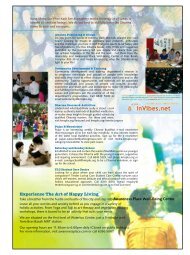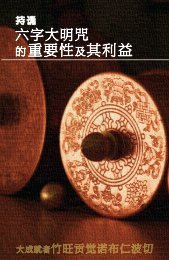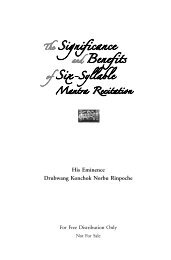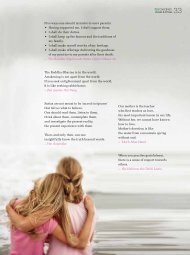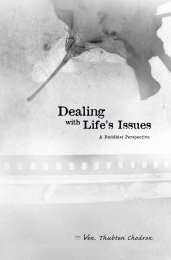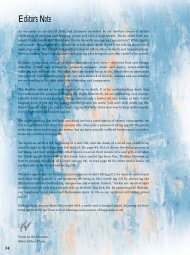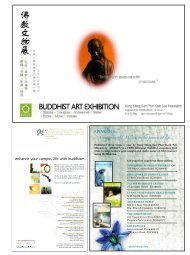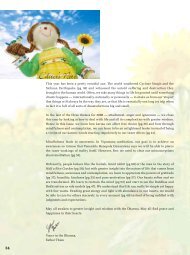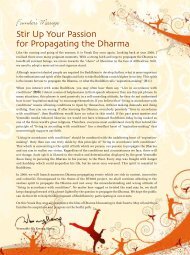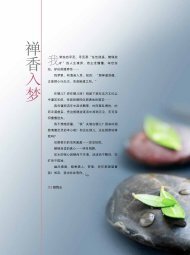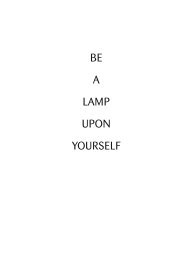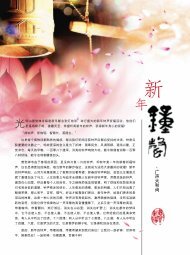Editor's Note - Dharma Resources - Kong Meng San Phor Kark See ...
Editor's Note - Dharma Resources - Kong Meng San Phor Kark See ...
Editor's Note - Dharma Resources - Kong Meng San Phor Kark See ...
You also want an ePaper? Increase the reach of your titles
YUMPU automatically turns print PDFs into web optimized ePapers that Google loves.
Is it Important to Take Refuge<br />
in the Triple Gem<br />
Q<br />
:<br />
Why is taking refuge in the Triple Gem<br />
important — Enquirer<br />
A<br />
: The going for refuge is the door<br />
of entrance to the teaching of<br />
the Buddha. It functions in the context<br />
of the teaching as the entranceway<br />
to all the practices of the Buddhist<br />
discipline.<br />
To engage in the practices in their proper setting we<br />
have to enter them through the door of taking refuge,<br />
just as to go into a restaurant and have a meal we have<br />
to enter through the door. If we merely stand outside<br />
the restaurant and read the menu on the window we<br />
may come away with a thorough knowledge of the<br />
menu but not with a satiated appetite. Similarly, by<br />
merely studying and admiring the Buddha’s teaching<br />
we do not enter upon its practice. Even if we extract<br />
certain elements of practice for our personal use<br />
without first taking refuge, our efforts cannot count<br />
as the actual practice of the Buddha’s teaching.<br />
They are only practices derived from the teaching,<br />
or practices in harmony with the teaching, but so<br />
long as they are not conjoined with a mental attitude<br />
of taking refuge in the Triple Gem they have not yet<br />
become the practice of the Buddha’s teaching.<br />
We can further suppose that this person has met the<br />
Buddha’s teaching, appreciates it and respects it, but<br />
does not feel sufficiently convinced to acknowledge<br />
its truth or find himself impelled to go for refuge.<br />
On the other hand, let us suppose there is another<br />
person whose circumstances prevent perfect<br />
observance of the precepts and who cannot find<br />
leisure for practising meditation. But though he lacks<br />
these achievements, from the depths of his heart,<br />
with full sincerity, understanding and dedication of<br />
purpose, he has gone for refuge to the Triple Gem.<br />
Comparing these two persons we can ask whose<br />
mental attitude is of greater long-term spiritual<br />
value — that of the person who without going for<br />
refuge observes the moral principles embedded in<br />
the five precepts and practises meditation several<br />
hours a day, or that of the other person who cannot<br />
accomplish these practices but has sincerely gone<br />
for refuge to the Buddha, Dhamma and <strong>San</strong>gha.<br />
No clear pronouncement on this case is found in<br />
the suttas (sutras) and commentaries, but enough<br />
indication is given to support an intelligent guess.<br />
On this basis we would say that the mental attitude<br />
of the second person, who has gone for refuge with<br />
clear understanding and sincerity of heart, is of<br />
greater long-term spiritual value. The reason for<br />
such a judgment is as follows.<br />
Q & A<br />
awaken<br />
36<br />
To bring out the significance of going for refuge we<br />
can consider a contrast between two individuals.<br />
One meticulously observes the moral principles<br />
embedded in the five precepts (pañcasila). He does<br />
not formally undertake the precepts in the context<br />
of Buddhist ethical practice but spontaneously<br />
conforms to the standards of conduct they enjoin<br />
through his own innate sense of right and wrong;<br />
that is, he follows them as part of natural morality.<br />
We might further suppose that he practises<br />
meditation several hours a day, but does this not in<br />
the framework of the Dhamma (<strong>Dharma</strong>) but simply<br />
as a means to enjoy peace of mind here and now.<br />
As a result of his moral and meditative practices the<br />
first individual will enjoy peace and happiness in his<br />
present life, and will accumulate merit which will<br />
lead to a favourable rebirth in the future. However,<br />
when that merit ripens, it will be exhausted and will<br />
expend its force without leading to further spiritual<br />
development. When the fortunate rebirth resulting<br />
from the merit comes to an end, it will be followed<br />
by rebirth in some other plane, as determined by<br />
stored-up kamma (karma), and the person will<br />
continue to revolve in the cycle of existence. His<br />
virtuous undertakings do not contribute directly to<br />
the transcending of the samsaric round.



